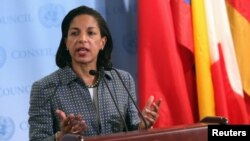UNITED NATIONS —
The U.S. ambassador to the United Nations, Susan Rice, has expressed concern about the Sudanese government's failure to resolve outstanding issues with South Sudan, which she says could spark a resumption of conflict between the neighbors.
In May, the U.N. Security Council adopted a resolution calling for a cessation of hostilities between the two states, which at the time were at risk of an all-out armed conflict, with aerial bombardments, support to rebel groups and cross-border military movements.
Since then, there has been a significant reduction of violence and tensions, but the two Sudans have not implemented all of the Security Council’s demands, which were made with the support of the African Union.
An August deadline has been extended until September 22, and if the parties fail to resolve outstanding issues by then, the Security Council could impose sanctions on the spoilers.
The Security Council held a closed-door meeting on the situation Thursday. Afterwards, Ambassador Susan Rice told reporters that the United States is deeply concerned about the slowness of the parties, particularly the government of Sudan, to fully implement the council’s resolution and the consequences it could have.
“In particular, Sudan’s continued refusal to accept the AU High Level Implementation Panels’ November 2011 map, as required by this council and by the AU road map, calls into question Khartoum’s seriousness. Its refusal has prevented the establishment of a safe demilitarized border zone and the deployment of the Joint Border Verification Monitoring Mechanism. And it risks the resumption of outright conflict," said Rice.
Ambassador Rice said Washington also is disappointed with Khartoum’s refusal to implement an agreement on oil resources until all other outstanding issues are settled.
“It is our view, that at a minimum, the parties should work closely now with the oil companies to take the technical steps required to ensure that oil can start flowing as soon as a final political decision is reached," she said.
The ambassador also called for immediate humanitarian access to persons in the border states of South Kordofan and Blue Nile, where months of fighting and food shortages have led to a worsening humanitarian situation.
In May, the U.N. Security Council adopted a resolution calling for a cessation of hostilities between the two states, which at the time were at risk of an all-out armed conflict, with aerial bombardments, support to rebel groups and cross-border military movements.
Since then, there has been a significant reduction of violence and tensions, but the two Sudans have not implemented all of the Security Council’s demands, which were made with the support of the African Union.
An August deadline has been extended until September 22, and if the parties fail to resolve outstanding issues by then, the Security Council could impose sanctions on the spoilers.
The Security Council held a closed-door meeting on the situation Thursday. Afterwards, Ambassador Susan Rice told reporters that the United States is deeply concerned about the slowness of the parties, particularly the government of Sudan, to fully implement the council’s resolution and the consequences it could have.
“In particular, Sudan’s continued refusal to accept the AU High Level Implementation Panels’ November 2011 map, as required by this council and by the AU road map, calls into question Khartoum’s seriousness. Its refusal has prevented the establishment of a safe demilitarized border zone and the deployment of the Joint Border Verification Monitoring Mechanism. And it risks the resumption of outright conflict," said Rice.
Ambassador Rice said Washington also is disappointed with Khartoum’s refusal to implement an agreement on oil resources until all other outstanding issues are settled.
“It is our view, that at a minimum, the parties should work closely now with the oil companies to take the technical steps required to ensure that oil can start flowing as soon as a final political decision is reached," she said.
The ambassador also called for immediate humanitarian access to persons in the border states of South Kordofan and Blue Nile, where months of fighting and food shortages have led to a worsening humanitarian situation.




